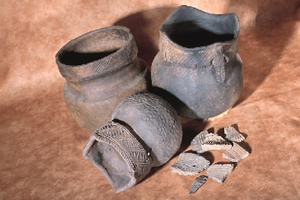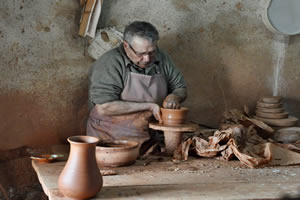Day 212, Chronological Bible Study
Timeline. Map. Go to today’s Bible reading (use your browser arrow to return): Jeremiah 18:1–19:13
Useful or Useless?
Who hasn’t gone through their cupboards and thrown away old cracked and chipped dishes? Why do we do it? We do it simply because they are unsightly, and we don’t believe they’re useful. We probably never saw those dishes being made. Workers may have crafted the clay or ceramic dishes, cups, or bowls in a pottery factory (see how they do it).
While we may not do things the same as potters did in Biblical times, still the image of a potter working with clay is useful; it shows how God works in the lives of His people at any age in time. The prophet Isaiah declares, “Yet, O LORD, you are our Father. We are the clay, you are the potter; we are all the work of your hand” (Isaiah 64:8, NIV).
In today's Bible reading from the book of Jeremiah, God expands on that illustration. Much later in history, the Apostle Paul would identify Gentile Christians (non-Jewish believers) as also being a people of God, moldable as He sees fit (Romans 9:19-26).
In the old-fashioned way, when a potter molds clay, he puts a lump on a potter’s wheel. As he keeps it spinning by a foot pedal and string (or by electricity in our modern world), he adds small amounts of water to the clay and forms it with gentle hands and fingers and tools into the shape he desires. If he doesn’t like what he is making, he starts over until it’s just right. Then he hardens it in a kiln. Afterward, he holds the pottery up to the light. If there are no cracks, he can paint and finish it. If there are cracks, despite his best efforts, he throws it away.
The LORD is the potter and we are the clay. Will we yield to the gentle hands and fingers of God in our life, or will we, in our hard hearts, crack and be useless as vessels? If we are followers of Christ He will not throw us away because we have a relationship with him (more...), but He may put us on the shelf and not use us.
God pitched Israel because she became a worthless broken vessel. She was now in exile. Assyria threatened to destroy her sister nation, Judah, too, but God came to her rescue. He destroyed the Assyrian army; the LORD was not ready to pitch the Judean people. He wanted to give her another chance to repent and be useful to Him. Now Assyria was weak and Babylon destroyed her capital city, Nineveh. Babylon will soon control all Mesopotamia, Israel, Syria, Egypt, and Jordan.
Judah does not repent for long. She becomes a cracked and worthless vessel, not worth saving. She won’t listen or respond to God’s molding hands. God tells Jeremiah to warn the people,
“Now therefore say to the people of Judah and those living in Jerusalem, ‘This is what the LORD says: “Look! I am preparing a disaster for you and devising a plan against you. So turn from your evil ways, each one of you, and reform your ways and your actions.”
“But they will reply, ‘It's no use. We will continue with our own plans; each of us will follow the stubbornness of his evil heart’” (Jeremiah 18:11-12, NIV).
God asks, “Who has ever heard of anything like this?” (Jeremiah 18:13, NIV). Judah has rejected its maker, its savior, in favor of worshipping lifeless idols which cannot help her. She prefers to die rather than cry out to God for mercy.
Does this describe us or anyone we know? Let’s not be foolish—their salvation is only in the LORD. We must cry out to Him for mercy. He is the only true hope for any of us. (more...)
Jeremiah is then told to call together some elders and priests of the people and lead them to Topheth, their place of idol worship and child sacrifice. Topheth is in the valley of Ben Hinnom, southwest of the city of Jerusalem and also serves as the community dump. There, the people toss their broken clay pottery and refuse to burn. Later, Gehenna, an illustrative name for hell will replace the name Topheth.
God then instructs the prophet to take a clay jar from the potter with him. In front of the eyes of the elders and priests, he smashes it. This object lesson is a visual illustration to get their attention, and it accompanies Jeremiah’s message: because they won’t stop doing evil, God would soon smash Judah, and their capturers would slaughter those outside the city. During the coming siege, those who seek refuge in the city will resort to cannibalism in their extreme hunger. Babylon will destroy all Judah, and they will exile survivors (Jeremiah 19).
The people at Topheth do not like Jeremiah's message of judgment, so they persecute him. In our next Bible reading, we will see what the LORD does to get Judah’s attention and punish her for persecuting Jeremiah. God defends his servants.
Take-Away Lessons
- Like Judah and Israel, God says we are also like pottery (Romans 9:19-26). Will we yield to the gentle hands and fingers of God in our life, or with hard hearts, will we crack and be useless vessels?
- Like the lessons of the potter and the clay, object lessons can be effective to illustrate messages, especially for those who are not listening.
- Let's not be foolish by rejecting the LORD—in him is our salvation! We must cry out for mercy and forgiveness, for he's the only true hope for any of us (more...).
- We may suffer if we warn people about their sins, but God will still be our help and defense. (2Timothy 3:12; 2Peter 2:9; Revelation 2:10c)
(Matthew 5:22, 29-30; 2Peter 2:4; The Bible Knowledge Commentary of the O.T., edited by Walvoord and Zuck, ©1985, pp. 1140 and 1154).
Focus Verses
2Timothy 2:20-21 (NASB ’95)
Now in a large house there are not only gold and silver vessels, but also vessels of wood and of earthenware, and some to honor and some to dishonor. Therefore, if anyone cleanses himself from these [the dishonorable] things, he will be a vessel for honor, sanctified, useful to the Master, prepared for every good work.
Write a private prayer response to today’s Bible study:
Please send your comments to me
Looking Ahead: As a Christian, this will seem like an oxymoron, but how do we know When We Shouldn't Help?
Back to top of page
Go to Scriptures main page
Go to Topics main page
Go to Home pagere-edited 8-3-22
COPYRIGHT @ 2019, MASTER'S TOUCH BIBLE STUDIES


